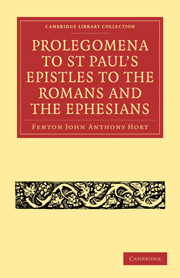I - RECIPIENTS
Published online by Cambridge University Press: 29 August 2010
Summary
The title is πρὸς ʾΕϕεσίους, To the Ephesians. Whatever be the date or authority of that title, of course it does not proceed from St Paul: it expresses simply an early belief or an early tradition, the probable authority of which we must reserve for further consideration. But obviously this title is supported by the common text of v. I, which clearly says τοῖς ἁγίοις τοῖς οὖσιν ἐν ʾΕϕέσῳ καὶ πιστοῖς ἐν Χριστῷ ʾΙησοῦ. This common text, however, is open to the gravest doubts. The greater part of the external evidence unfavourable to it has become known only in quite recent times: yet for some two centuries past a succession of critics have strongly questioned its integrity. The words ἐν ʾΕϕέσῳ are omitted by the two manuscripts which are not only oldest, but also best, ℵ B, and by the corrector of a later ms. (67) whose corrections are evidently taken from another quite different ms. of great excellence, now lost. Early in the third century Origen, commenting on the Epistle, uses language which shews that these words were absent from his text, i.e. his interpretation would be unintelligible if they were present. About one and a half centuries later Jerome shews a knowledge of Origen's interpretation but this cannot count as independent evidence.
- Type
- Chapter
- Information
- Publisher: Cambridge University PressPrint publication year: 2009First published in: 1895

